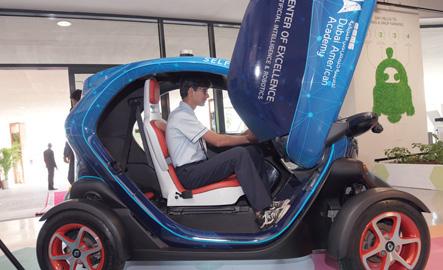
12 minute read
and Space at GEMS International School GEMS Dubai American Academy opens a
AI and Robotics

Advertisement

GEMS Education’s new Centre of Excellence for AI and Robotics will promote and deliver outstanding future-technology learning experiences for students
The launch of a new Centre of Excellence for Artificial Intelligence and Robotics at GEMS Dubai American Academy (DAA) is a response to the rapid rate of technological changes in today’s world. The new Centre aims to ensure current models of education remain relevant to the dynamic nature of industry as well as promote educational and research activities in the field of AI and robotics. It will help to bridge the gap between businesses and educators with a capability to harness the energy of the academic
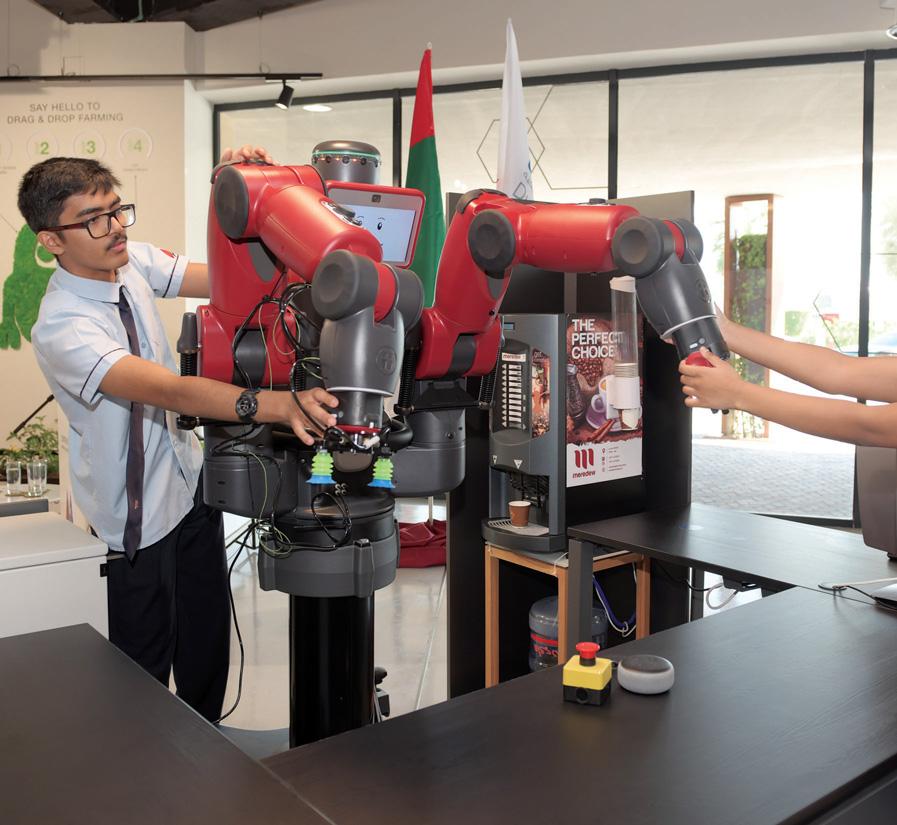
DAA’s Centre of Excellence offers a Mixed Reality Zone featuring virtual reality (VR), mixed reality (MR) and augmented reality (AR) with software like Unity 3D. It also features an electric self-driving car
world with state-of-the-art AI and robotics technologies, while serving as a platform for intelligence-sharing and technology collaboration in these areas.
Commenting on the Centre of Excellence, Sreejit Chakrabarty, Director of Robotics & Artificial Intelligence at DAA as well as Robotics, STEAM and Artificial Intelligence Network Leader at TELLAL, said: “The idea behind the GEMS Education Centres of Excellence is to bridge the gap that exists between K-12 education, higher education and the workforce.
> The Centre of Excellence gives students at DAA access to AI and emerging cutting-edge technologies and exposes them to real-life challenges
In doing so, we can bring the expert knowledge that exists in the industries right down to a schoolgoing student. We are partnering with local and global universities as well as industries in building new learning and developmental pathways, allowing our students to get exposed to future skillsets and potential future jobs.”
DAA’s Centre of Excellence offers a range of cutting-edge technologies such as a Mixed Reality Zone featuring virtual reality (VR), mixed reality (MR) and augmented reality (AR) manufactured hardware from Facebook, Microsoft and HTC, with software like Unity 3D. The Centre also features a self-driving car – an autonomous, customised and fully electric Renault Twizy.
“At DAA, we realise that everything we love about civilisation is a product of intelligence,” continued Sreejit. “Which means amplifying our human intelligence with artificial intelligence has the potential to help civilisation flourish like never before – as long as we manage to keep the technology beneficial. Our Centre of Excellence gives our students access to cutting-edge technology and research opportunities and exposes them to real-life challenges, encouraging them to solve the same using AI and other exponentially emerging technologies.”
In the robotics segment, the Centre showcases the Baxter Robotic Arm, a collaborative research robotic arm that is capable of advanced facial recognition and machine learning using industry-grade ROS (Robot Operating System) and Python coding. There are also assembly line robotic arms in the form of the Dobot Magician robotic arm industry 4.0 setup, which mimics an assembly line using varied end effectors such as grippers, suction cups and laser engravers.

What exactly is in the Centre of Excellence for AI and Robotics?
Mixed Reality Zone • Using VR, MR and AR
manufactured hardware from Facebook, Microsoft and HTC, with software like Unity 3D.
Self-Driving Car • An autonomous, customised and fully electric Renault Twizy that has been retrofitted with cameras, radars, and LIDARS by Velodyne. The car showcases self-driving technology and the future of urban mobility.
Baxter Robotic Arm • Collaborative research robotic arm, capable of advanced facial recognition and machine learning using industry-grade ROS (Robot Operating System) and Python coding.
Assembly Line Robotic Arms • Dobot Magician robotic arm industry 4.0 setup, mimicking an assembly line using varied end effectors such as grippers, suction cups and laser engravers. Coding Zone and EEG Brain Scanning Technology • Tobii Iris Tracking for advanced computer accessibility. • Emotive Epoc+ Scientific
Contextual EEG to monitor brain waves and gather brain data to be used in many ways, including controlling various hardware.
Mini-Maker Space • Equipment including
multicoloured printing by Delta 3D printers, vacuum forming machines, a CNC router and a multi-tool 3D printer including an edible food paste injector.
Media Zone • YouTube video production
using greenscreen technology, as well as live teleconferencing with university professors and industry experts remotely.
Focus Area • A space that provides an
environment conducive to innovative thinking and collaborative brainstorming.

Global Innovation Challenge
1,500 student innovators and entrepreneurs exhibited their tech solutions at this year's GEMS Global Innovation Showcase
The fourth edition of the region’s largest youth innovation and entrepreneurship exhibition took place in Dubai and Abu Dhabi in February. The GEMS Global Innovation Showcase saw over 1,500 youth innovators across 400 teams present their high-tech solutions to global and corporate challenges.
Participating teams made the most of exponential technologies such as machine learning and data science to address some of the world’s most pressing issues across a range of topics including healthcare, education, disaster resilience and prosperity. Students exhibiting at the events, which were part of the annual Global Innovation Challenge,
< The Cambridge High School, Abu Dhabi student Hriday Thakkar, 2019 Winner of the ENBD Challenge, presents his project Noon Z; GEMS Modern Academy student Vishweswar Eswaran presents his project FoodOre (bottom)


were shortlisted from a pool of 50,000 students across the GEMS Education network.
This year’s Global Innovation Challenge projects ranged from natural calamity warning drones (Team Natural Disaster Detective from GEMS Wellington International School) and sensorloaded modular hydroponics-based micro-cultivation platforms for refugees (Team FoodOre from GEMS Modern Academy), to a smart watch catering to the needs of patients suffering from cognitive impairment such as dementia and Alzheimer’s (Team Neureno from GEMS New Millennium School – Al Khail).
The Dubai edition of the event was held at GEMS Wellington Academy – Al Khail, while the Abu Dhabi edition was hosted by The Cambridge High School, which also welcomed Her Excellency Marcy Grossman, the Canadian Ambassador to the UAE. As well as 100 industry judges, some 3,500 visitors were in attendance across both events.
The teams selected as finalists will be inducted into a two-month acceleration programme that includes personalised industry mentorship and entrepreneurship workshops covering design thinking, prototyping, business planning, marketing and pitching. Winners will have the opportunity to attend a special two-week entrepreneurship bootcamp in July at the Ryerson Creative Academy GEMS Programme in Canada. Students will be flown to Ryerson’s main campus in Toronto, where they will participate in exclusive workshops, further develop their prototypes, join a community of entrepreneurs and be exposed to North America’s entrepreneurial ecosystem. The workshops will cover topics such as design thinking, lean start-up, value proposition, market research, prototyping, brand identity, funding, marketing and IP. Teams will also receive immigration consulting and application review support.
GEMS Education has partnered with ecommerce giant Noon to set up the ‘GEMS Noon next challenge’, geared towards redefining the online shopping experience and increasing sustainability in logistics. GEMS Education students were given the chance to visit Noon’s headquarters and warehouse to better understand the online retail industry . Michael Gernon, Chief Education Innovation Officer at GEMS Education, leads GEMS X, the R&D arm of the organisation: “The Global Innovation Challenge is one of the most spectacular highlights in the GEMS X calendar. To see what students are creating in solving some the world’s greatest challenges is truly extraordinary. Their understanding of the world of the future is exemplified through both the challenge and also the unique curriculum that every GEMS student is exposed to – an understanding of the impact of exponential technologies on future society.”
Canadian Ambassador to the UAE, Her Excellency Marcy Grossman: “The partnership between Ryerson Creative Academy and GEMS Education is a great example of how Canadian education institutions can support talented students from the UAE to become tomorrow’s entrepreneurs. GEMS students who participate in this programme in Toronto will have the opportunity to experience one of the most vibrant innovation ecosystems in North America.”

The defining tech of our time
We speak to Adeesh Goel, Programme Head of Inspirit AI Camps, a special holiday programme for students focused on artificial intelligence and run by Stanford University graduate students and alumni
What is the AI camp in a nutshell, how did it come about and what makes it unique? AI Scholars is a two-week projectbased intensive camp for high school students covering both the technical knowledge and the ethical considerations important to building powerful AI applications. Our instructors and students had a deeply enriching experience working together in Dubai during our last camp in December.
We came together with the goal of making AI education accessible and engaging to students across the world. Our team consists of graduate students and alumni at Stanford University, pursuing research and work in different areas such as neuroscience, bioinformatics, autonomous vehicles and more. We’re excited about the limitless potential to
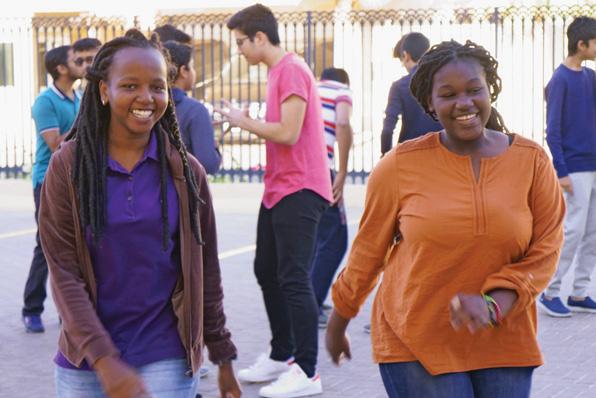
apply this technology for good. Moreover, teaching is our passion and we’re working on creative approaches to empower students to build AI projects and make an impact in their area of interest.
How has the camp been received and have you been impressed by students’ contributions? The students who attended our last camp had an enriching experience and enjoyed both the technical as well as social components of the programme. This was evident from their feedback and their exuberance during presentation day.
Why is AI important and why should our young people be learning about it? Artificial intelligence is the defining technology of our time, powering
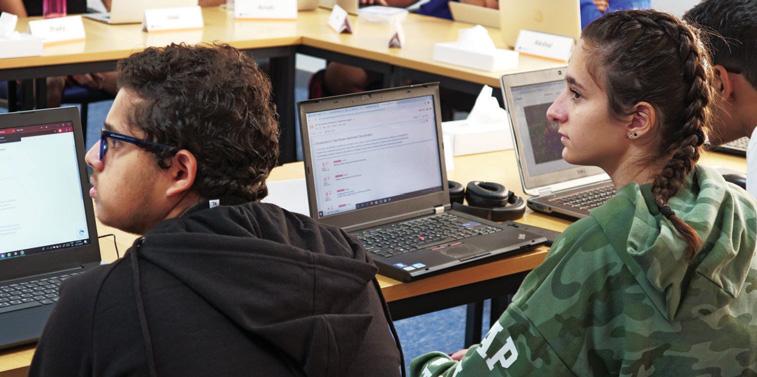
Two-week project-based intensive camp AI Scholars took place in Dubai last December with the aim of making AI education accessible for students
radical innovation across industries such as healthcare, education, transportation, government and more. It is already being applied to almost every discipline on the planet. It does not matter what career path a student wants to pursue, AI will certainly be a part of it. Doctors use AI in innumerable ways to diagnose diseases through x-rays, etc., journalists use it to detect fake news, and governments use it for the efficient dissemination of food supplies during disasters. Our young generation must be equipped to handle the possibilities and ethical challenges that modern artificial intelligence will pose. “The course opened my eyes to a new realm of possibilities that I was previously unaware of. The skills developed will be helpful for me going forward and the newfound interest I have gained in this field might help me to narrow down the future pathway I want to take. This was an incredible and eye-opening experience for me and I would definitely do it again.” – Neel Vora, GEMS Wellington International School
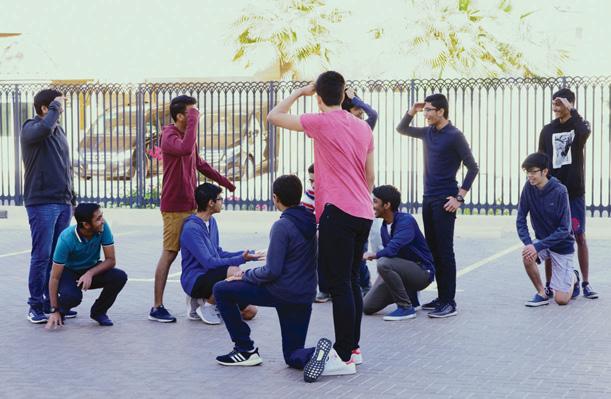
“The experience was amazing because it enabled me to learn new concepts and practice critical thinking when asked to solve a problem. Moreover, it enabled me to open my mind about AI and increase my interest in AI. It has also taught me how to work with different people and boosted my confidence.” – Naomi Oyiengo, Nova Pioneer Girls School, Kenya
“We were amazed by the curiosity, diligence and creativity of our students. Some students went above and beyond with their projects and made live applications to detect fake news, or perceive human emotions from images using computer vision and solved other socially meaningful problems. Their excitement was infectious and kept the instructors motivated, too. We cannot wait for what’s to come next.” – Inspirit AI Instructor
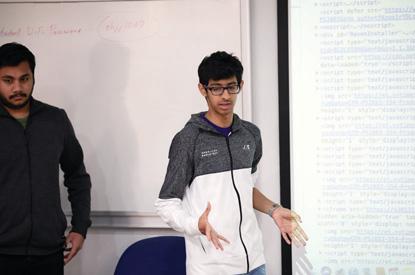
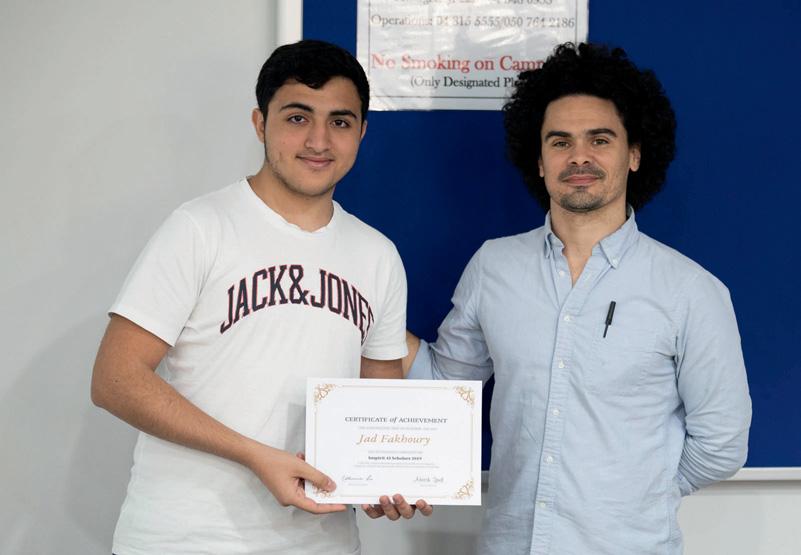
Jad Fakhoury, a Year 13 student at GEMS Wellington Academy – Al Khail studying his Computer Science, Mathematics and Business A-Levels, won a full scholarship to attend the Inspirit AI Camp through the GEMS UniConnect programme. He explains what he gained from the experience.
I learnt how the backend code of AI is programmed and how to implement and use many different third-party packages to make fully functional and accurate AI models using the programming language Python. The other students and I were given a choice to specialise in one of the many interesting applications of AI.
I chose facial recognition and made a model that is 94 per cent accurate in detecting the emotion of a given person in a picture. This could be beneficial to society, as it can help children with autism train themselves and learn what each emotion is. As with any other programmer, I faced some challenges along the way, including starting with only 4 per cent
accuracy for my model, which was disastrous for a first test. My team and I had to switch up the neural network used to get better results, which took some time to do but, in the end, was definitely worth it. Ever since I started learning computer science, I have been intrigued about AI and how it can be used and applied in the real world. Even though I have worked on projects with AI before, I still look for ways to push myself to the limits of learning new skills every day, especially in this field. Attending the Inspirit AI Camp has helped me learn more about AI and
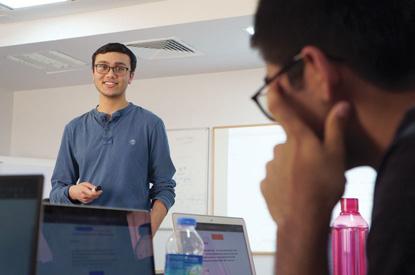
Students at the AI Camp last December could specialise in one of the many practical applications of AI
the backend work that has to be done before we can share it with the world and through the Internet. I plan to go to university and get a degree in computer science, specifically in artificial intelligence. In terms of career, I want to continue to work on projects to do with AI and hopefully be responsible for a breakthrough or enhancements in future AI technology.
The next AI camp
Location: GEMS Dubai American Academy Dates: 16-27 August 2020 (10 days, weekdays only); Morning (8am – 12 noon) or afternoon batch (1pm – 5pm) Prerequisites: Students from complete beginner (beginner batch) to experienced programmers (advanced batch) can apply at www.inspiritai.com










